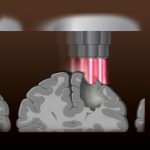
Source: Wenjing Wu
Designing drugs that attack only tumor cells but not healthy cells is complicated.
Xuequan Zhou, a PhD student from Leiden University, created an anticancer compound with a molecule that can self-organize in nanoparticles and become activated only under blue light irradiation. The new properties allow the drug to be activated only when needed and thus could be instrumental in killing cancer cells without damaging healthy cells. The research team conducted experiments in vitro and also in vivo using a mouse tumor model. The article is published in the Journal of the American Chemical Society.
Along similar lines, a team from Penn State University developed light-activated nanoparticles to target cancer cells. The nanoparticles can bind with microRNA (miRNA) molecules, and those can be released in the cancer cells when exposed to light, thus sparing healthy tissue. The miRNA molecules will then pair to a messenger mRNA and inhibit proteins’ production essential for cancer cells’ survival. The paper is published in Biomaterials.